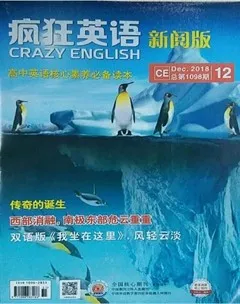自幼爱读书
2018-12-29闫洪伟
[精彩导读]
本杰明·富兰克林是美国杰出的文学家、政治家、思想家、发明家,被称为“美国之父”。阅读为他一生打下坚实基础,他最大的遗憾是在渴求读书的时代,找不到合适的书读。为此他选择12岁就到哥哥的印刷厂做学徒,借以接触到丰富的书籍资源。他读书是重塑并形成个人能力的过程。让我们一起共读富兰克林的自幼爱读书的心路历程。
From a child I was fond of reading, and all the little money that came into my hands was ever laid out in books. Pleased with The Pilgrims Progress, my first collection was of John Bunyans works in separate little volumes. I afterward sold them to enable me to buy R. Burtons Historical Collections; At a time when I had such a thirst for knowledge, more proper books had not fallen in my way. There was a book of Defoes, called An Essay Upon Projects, and another of Dr. Mathers, called Essays to Do Good, which perhaps gave /nAq5vLylHjZNOvavB+VxQp4kuIOTgY5sDPCuL6p184=me a turn of thinking that had an influence on my life.
In 1717 my brother James returned from England with a press and letters to set up his business in Boston. Although I was twelve years old, I decided to serve as an apprentice(学徒)till I was 21. Then I made progress in the business quickly, and had access to better books. Often I sat up in my room reading the greatest part of the night, when the book was borrowed in the evening and to be returned early in the morning, lest it should be missed or wanted.
About this time I met with The Spectator. I had never before seen any of them. I bought it, read it over and over, and was much delighted with it. I thought the writing excegBaNwfmrweEJFyzddEWjS74dcQV2YNI90wLkCPuLWws=llent, and wished, if possible, to imitate it. With this view I took some of the papers, and, making short hints of each sentence, laid them by a few days, and then, without looking at the book, tried to complete the papers again, by expressing each hint at length, and as fully as it had been expressed before, in any suitable words that should come to hand. Then I compared my Spectator with the original, discovered some of my faults, and corrected them. But I found I wanted a stock of words, or a readiness in recollecting and using them. Therefore I took some of the tales and turned them into verse(韵文); and, after a time, when I had pretty well forgotten the prose(散文), turned them back again.
I also sometimes mixed my collections of hints, and after some weeks tried to reduce them into the best order, before I began to form the full sentences and complete the paper. This was to teach me methods in the arrangement of thoughts. By comparing my work afterwards with the original, I improved a lot, which encouraged me to think I might possibly in time come to be an English writer. My time for these exercises and for reading was at night, after work or before it began in the morning, or on Sundays, when I stayed in the printing-house alone.
Reading check
What good qualities should we learn from Benjamin Franklin according to the text?Please write a review for the passage.
Language study
Ⅰ.Words in the context
Ⅱ.Vocabulary
1.separate adj. 分开的;不同的
2.lest conj. 唯恐;以免
3.excellent adj. 卓越的;优秀的
4.imitate v. 模仿;仿效
5.hint n. 暗示;迹象
6.arrangement n. 整理;安排
7.lay out 花(钱);铺开;设计;阐述
8.have a thirst for 渴望
9.have an influence on 对……有影响
10.serve as 担任;充当
11.have access to 有权使用;接近
12.if possible 如果可能的话
13.at length 充分地;详尽地;终于
14.compare... with 把……与……相比
Ⅲ.Difficult sentence
By comparing my work afterwards with the original, I improved a lot, which encouraged me to think I might possibly in time come to be an English writer.
翻译:
【点石成金】本句主句是I improved a lot。By comparing my work afterwards with the original为方式状语。主句之后的which引导定语从句,先行词是前面整个主句,从句中in time不是“及时”的意思,而是“经过一段时间后”。
